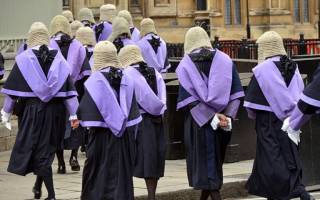Find out more about the events held in 2020
Regeneron - Good or Bad?
25 November 2020

Earlier this year in June, the UK Supreme Court handed down the long-awaited judgment in Regeneron Pharmaceuticals Inc v Kymab Ltd [2020] UKSC 27. The Court, by a majority of four to one, found Regeneron's antibody patents invalid for insufficiency, thus overturning the Court of Appeal’s decision. In the Court’s view, a patent claim lacks sufficient support if it is not enabled across its entire scope - since the patent bargain requires the monopoly granted to match the contribution made to the art.
But was the Supreme Court right? Can a principle of general application now be patented? And if so, how?
- Read more about the seminar on the event page here.
- Watch a record of the even on the UCL Laws YouTube Channel here.
COVID-19: IP Law, Policy and Practice
28 May, 4 June and 2 July 2020

What is the likely impact of COVID-19 on IP law, policy and practice? This was the subject of debate at our series of virtual events, which one attendee described as 'an unexpected benefit of lockdown.' The three webinars attracted a large international audience. Over 500 attendees joined one or more sessions, logging in via Zoom from 45 different countries. The audience included IP practitioners, judges, academics and students as well as representatives from patent offices, policy think-tanks and NGOs, along with publishers and journalists.
The first event, held on 28 May, was entitled IP Rights for Treating, Diagnosing and Preventing COVID-19. The session, chaired by Professor Sir Robin Jacob, discussed the possible implications of the pandemic in respect of patents, designs, know-how etc for medicines, vaccines, diagnostics and medical devices.
Michael Conway, 8 New Square, kicked off with a review of the UK’s Crown Use and compulsory licensing provisions, which aim to protect the public interest in times of emergency. He also explored whether courts in different jurisdictions might refuse to grant an injunction in the case of infringement of COVID-19 connected IP rights, on the basis that it was not in the public interest to do so.
Professor Mark Lemley of Stanford Law School, outlined ‘The Open COVID Pledge’ which calls on organisations to licence their IP rights for free during the COVID-19 pandemic. Professor Lemley formed an international team of scientists and lawyers to devise the Pledge, hoping to accelerate the development and deployment of COVID-related apparatus, diagnostic tools, vaccines, therapeutics and software.
Professor David Lomas, UCL Vice Provost (Health), discussed the humanitarian ethos underlying the development of the UCL-Ventura breathing aids which work to keep COVID-19 patients out of intensive care. The device, developed by UCL engineers and clinicians along with Mercedes (Formula 1), received UK regulatory approval in record speed – being rolled out to NHS hospitals within a month of its initial conception. The design know-how has been placed in the public domain, with interest received from 105 countries, and local manufacture currently underway in 11 of these.
In Thomas Cueni’s presentation, the Director General of the International Federation of Pharmaceutical Manufactures and Associations argued that IP rights would not act as a barrier to new COVID-19 treatments or vaccines. In his view, IPR ensured that collaboration, data sharing and licensing would take place: all activities vital if newly developed products were to be accessible and affordable to all who need them.
Professor Patricia Danzon, The Wharton School, discussed COVID-19 related IP rights from the perspective of health economics. She highlighted the different considerations which arise depending upon whether a treatment was found by re-purposing an existing drug/s or in new therapeutics. In terms of vaccines, she outlined the different challenges faced by higher income countries (HICs) and less developed countries (LDCs).
Daniel Alexander QC, of 8 New Square chaired the second session, entitled COVID-19: Copyright, Competition Law and Privacy which took place on 4 June 2020.
Dr Emily Hudson, King’s College London, discussed the findings of her new paper concerning access to copyright material for educational purposes during the pandemic. This concludes that the current crisis merely highlights issues with the prevailing model for academic publishing, and predicts that COVID-19 would encourage universities to embrace in-house open access publishing more swiftly and for a greater body of material. This theme was picked up by Dr Paul Ayris, Pro-Vice Provost of UCL Library Services and Chair of Copyright for Knowledge, who discussed his involvement with open access publication and UCL Press. The speakers agreed that a culture change would be required before academic authors fully embraced the OA model.
Dr Michael Veale (Lecturer in Digital Rights and Regulation, UCL Laws and Digital Charter Fellow at the Alan Turing Institute) discussed the controversies surrounding the planned NHS contract-tracing app, and highlighted the difference, in terms of privacy implications, with the existing Apple/Google technology which the Government had rejected.
Dr Christopher Stothers (Visiting Professor, UCL Laws and Freshfields Bruckhaus Deringer) concluded the panel with a presentation which summarised the key changes brought about by the current health crisis in terms of competition, free movement and state aid law. He outlined current temporary measures seeking to ensure adequate supply and distribution of essential health products while avoiding abusive pricing.
The final event, entitled COVID-19 and the UK IP Professions, took place on 2 July. Chaired again by Professor Sir Robin Jacob, it considered how the COVID-19 crisis might serve as a catalyst for change for the UK IP professions.
Patent attorney Gwilym Roberts (Kilburn & Strode LLP) reported the findings of his research on the impact on patent filings of previous upheavals, including World War II and the Oil Crisis of the 1970s. Trade mark attorney, Catherine Wolfe (Boult Wade Tennant) recounted how the immediate impact of the pandemic has been very uneven across different industry sectors, and also discussed some of the positive and negative effects encountered when an entire firm is working from home.
Solicitor, Katharine Stephens (Bird & Bird) reviewed the impact on IP litigation, reporting a general downturn in the number of new claims being filed. More positively, she reported that the crisis had put paid to at least some outdated working practices and that firms were continuing to offer student summer schemes and recruit new trainees. Barrister, Iona Berkeley (8 New Square) praised how rapidly the UK IP courts and tribunals seem to adapt to video hearings which not only suited litigants based outside London, but enabled clients to be more involved in the proceedings more generally.
The final speaker was Sir Colin Birss, Justice of the High Court (Chancery Division) and nominated judge of the Patents Court. He too viewed enforced remote working as being likely to drive permeant positive changes, in terms of streamlined procedure and access to justice, while missing the collegial aspects of the Rolls Building. For a fuller report, read the IPKat Blog report here.
- Read more about the seminar on the event pages here and here.
- Watch a recording of the events on the UCL Laws YouTube Channel here, here and here.
- View the panel’s presentation slides here and here.
Question the Trade Mark Judges
11 March 2020

In this joint IBIL and MARQUES event, the audience were invited to meet and question some of the judges that are, or were until recently. deciding our trade mark disputes.
The Chair, The Rt Hon Professor Sir Robin Jacob posed a set of pre-selected questions from the audience to:
Emma Himsworth QC, Appointed Person, UK IPO
Judge Ian Forrester, General Court, Court of Justice of the European Union
The Hon Lord Justice Arnold, Court of Appeal of England & Wales
Find out more about the event here or watch this talk on our YouTube Channel.
What is the Function of Functionality in Trade Mark Law?
12 February 2020

About the event:
The subject matter of trade mark law has expanded. EU trade mark law, for example, permits any distinctive sign to be registered as a trade mark (provided that it can be represented clearly and precisely enough) which includes characteristics such as the shape or colour of the goods or its packaging. This could be problematic. While trade mark registration might protect the messages these features convey to consumers about the origin of those goods, the trade mark owner might also enjoy ‘back-door’ protection of what the product is, how it works or why it enjoys consumer appeal. In this way, trade mark law has the ability to encroach on aspects of a product which other IP rights are there to protect, or deem should properly vest in the public domain. Trade mark protection ceases to promote fair competition when it oversteps its intended role, and once product markets are blocked, consumers have to pay higher prices or simply make do with less choice.
Fortunately, EU trade mark law includes a safeguard in the form of three ‘functionality’ exclusions which keep free those characteristics of goods which other traders need to access in order to compete. These exclusions prevent registration of signs which result from the nature of the goods, which are necessary to achieve a technical result, or which otherwise give substantial value to the goods. The legislature clearly sees this as important because unlike many other absolute grounds for the refusal, an objection that the subject matter is ‘functional’ cannot be overcome by evidence that the mark has acquired a distinctive character. Yet, the effectiveness of these provisions is difficult to gauge, despite having been part of harmonised law for over 20 years. This area of law is not well-understood because the exact competition goals remain murky, and the extent to which the three exclusions overlap is unclear. Nevertheless, a provision that was originally limited to features of shapes, has been recently extended to cover other characteristics of goods. Although the intention is clearly to prevent a greater range of signs from achieving registration, the full extent of scope and likely application of the revised functionality provisions is now even more difficult to predict.
Perhaps we should look to US law for the solution, since functionality has been an integral part of US trade mark law for far longer. Yet arguably, the position over The Pond is not much clearer. Utilitarian functionality is applied inconsistently, despite a landmark ruling by the US Supreme Court on the subject, while aesthetic functionality – to the extent that courts actually recognise it as a doctrine – is rarely found, even when granting trade mark protection over a feature would seem to place competitors at ‘a significant, non-reputation-related disadvantage.’ UCL Law’s Institute of Brand and Innovation Law has brought together a distinguished panel to explore the proper role of the functionality exclusions in trade mark law.
Speakers
Professor Dr Annette Kur, Max Planck Institute for Intellectual Property and Competition Law
Allan James, Senior Hearing Officer and Head of Trade Mark Tribunal, UK IPO.
Professor Mark P McKenna, John P. Murphy Foundation Professor of Law, Notre Dame Law School, Indiana, USA
Professor Saeema Ahmed-Kristensen, Professor of Engineering Design, Royal College of Art
Chaired by: Daniel Alexander QC, 8 New Square, Deputy High Court Judge and Appointed Person, UK IPO.
Find out more about the event here, view the presentation slides here, or watch this talk on our YouTube Channel.
 Close
Close

